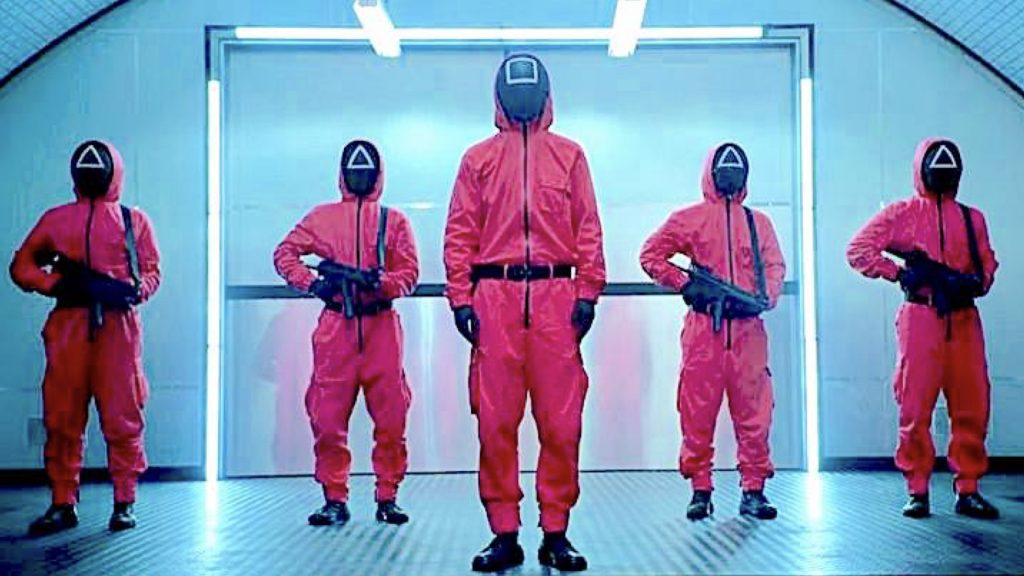
SNA (Tokyo) — Over 140 million people in over ninety countries around the world have already watched Squid Game, making the Hwang Dong-Hyuk creation the most-watched series in Netflix history.
Its pull is so powerful that many schools in Belgium, the United Kingdom, Canada, and the United States banned Halloween costumes inspired by the drama (which are sold at Amazon.com). The mayor of Seoul has filed a police complaint against the Korean Confederation of Trade Unions for wearing the red and black costumes during a large protest rally.
I too couldn’t stop watching it. Korean dramas show no sign of stopping their march toward global popularity, but nothing has wielded the prowess of this one. Perhaps many of my readers are binging Squid Game as well.
When first seeing the title, you might think, as I did, “What the heck does “squid game” mean”? It’s the name of a game Korean children play in parks, and many such games emerge in the drama. But the players are quirky, diverse, and desperate adults. (Potential spoilers ahead…)
The unemployed 47-year-old protagonist, Seong Gi-Hun (played by Lee Jung-Jae), can’t keep up with his growing gambling debts despite stealing money from his aged mother.
He faces the prospect of never again seeing his little daughter, who lives with his ex-wife and her new husband. He is drawn voluntarily into a bizarre game that offers him and 455 others the chance to win 45.6 billion won (almost US$39 million) if they survive six children’s games.
Here survive means, yes, survive.
This dark fantasy recalls Parasite, the 2019 Academy Award-winning film directed by Bong Joon-Ho. In its own credulity-straining way, Squid Game goes further, taking vicious stabs at the brutal inequality of our society and economy.
The work indicts capitalism itself. Players voluntarily risk their own and others’ lives in twisted child’s play in pursuit of a huge pile of cash that literally hangs over their heads.
The organization running the tournament represents the modern corporation, with a black-clad figure at the corporate helm and hierarchical layers of management, indicated by simple geometric shapes on red suits.
The players who risk their lives for a tiny chance to climb out of debt represent the proletariat.
In their real lives, penury, debt, and humiliation have driven them to the edge of suicide, only to be lured into this one lark of a last chance. The organizers set them in cruel competition against each other.
Super-rich VIP guests, representing shareholders, finance the entire project through gambling on the players like horses. They bet on their players by number and view the competition from a safe distance.
As players are “eliminated,” the pot of money they all fight for gets larger, underlining how human beings’ very lives have been commodified with an explicit price tag: 100 million won (about US$390,000) per life.
Organizers assert that the games are fair, equitable, and free of the discrimination the players face out in the real world.
The Front Man (corporate head) scolds a contestant for “interfering with democracy.” (He later apologizes for permitting an element of unfairness to enter the games.)
This mirrors the spine-chilling propaganda that bombards us daily to manufacture our consent to a brutal system created and run by our rulers, a system that includes frequent murderous acts of aggression and war by the global hegemon.
This game depicts Karl Marx’s analysis of class struggle in Das Kapital in terror-inducing relief, in a manner that drives home to the hearts of viewers the horror of our corporate system in a way that only art can.
That such a film cannot only be produced in South Korea but spread around the world faster than the worst pandemic in a century speaks volumes to a new zeitgeist that can no longer tolerate the lies, violence, and inequality.
The popularity of Kohei Sato’s award-winning 2020 work, Hitoshinse no Shihonron, or Capital in the Anthropocene, speaks to a rising consciousness of class struggle and a waning willingness to buy into our current political and economic system. This book calls for abandoning capitalism as the only way to claw our way out from our impending and self-wrought climate catastrophe.
I look forward to this trend continuing, to growing awareness of the desperate position of the working class vis-a-vis corporate power.
This article was written by Hifumi Okunuki, and originally published by the Shingetsu News Agency (SNA).

Comments are closed